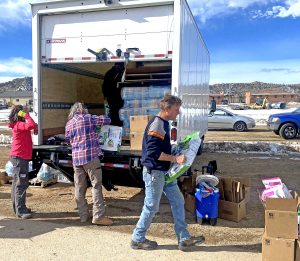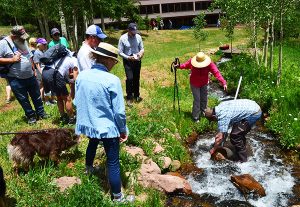LA VETA — Even in the wild, wild west of yore, not often did even the most skilled marksmen fell two men with one blow, but in September 1876, one did. He killed one man in anger, and one, peripherally, by accident. The victims were a politician and a priest. Silverio Suaso, or Suazo, was the politician. He had been elected to the territorial legislature from Huerfano County in 1867 and served a year in the House. In 1872, and again in 1876, he was elected to the “council”, or senate. He was a Republican with special interests in Indian affairs, a state penitentiary, immigration and a territorial library. He was passing through La Veta on his way home from the constitutional convention in Manitou, where legislators were gathered to frame the month-old state’s new laws and do some politicking on the side. During the evening of Sept. 3, Suaso arrived in La Veta and made a political speech. He no doubt caught his listeners up on the latest news of the new constitution and the proposed candidates for the first state election slated for Oct. 3, just a
month away. He then joined a group of carousers around Francisco’s Plaza. The merrymakers evidently had been celebrating something in the nearby saloons and Suaso joined in. The men commenced playing cards and were still drinking. Soon, he was in an argument with some of the others, whom he accused of robbing him. He’d lost some $35.00 that had been sitting on the table. He drew his revolver and, using the butt, began thrashing away at some of the others. Bystanders defused the situation, and Suaso left. Unfortunately, he returned, and again began a tirade. A fracas broke out with everyone waving revolvers. The men rushed from the room with Suaso following, and thus entered “an adobe yard”. Suaso struck several men with the pistol, including one Eligio Perea, who grabbed a convenient “grubbing hoe” (also referred to as an irrigating hoe) and gave Suaso an enormous whack on the head. The wound was grievous and bled freely. Suaso was deemed mortally wounded and removed to Dr. C.A. Washington’s drugstore, which also served as his medical office. The incident occurred about 8:30 in the morning, after a long, long night of drinking. Evidently citizens had notified Fort Garland of the ruckus and requested assistance. A Dr. Gordon, military surgeon at the fort, arrived at about 5 p.m., escorted by a troop of soldiers. He examined Suaso carefully, noted the five inch long gash in the side of the man’s head and threw hope to the winds. His ante-mortem (since his patient was still living) pronouncement was, “Silverio Suaso, aged thirty-eight, born in Colorado in 1839. Dispute between parties occurred on September 3rd, 1876 – from alcoholism”. Silverio Suaso was actually born in Abiquiu, NM in June 1838. He was included in the 1860 census for Taos County when he was living in Rio Arriba. When he moved to Huerfano County is unknown, certainly before his election in 1867, but he was by 1876 an influential speaker among his constituents. Perea had escaped into the brush near the plaza, but was soon rounded up by volunteers and locked into a room in the Plaza for his own safety. Tempers were running high, and many of the mob would have strung Perea up had not the doctor and troops arrived in the afternoon. Also called to the scene was Suaso’s pastor, the Rev. Louis Merles of Walsenburg. Merles and his wagon driver got only three miles from Walsenburg when the wagon lurched and threw Fr. Merles out into the road and onto his head. Unconscious, he was taken back to Walsenburg and made comfortable in a private home. Perea was brought before a judge the next morning at 10 for a preliminary trial for murder, even though Suaso was still alive. Attorneys were present, and a technicality in the warrant caused a recess until 1 p.m. while the judge considered the options. Meanwhile, on Sept. 4, “Suaso died peacefully, in the arms of Fred Walsen, postmaster of Walsenburg, and surrounded by his wife, sister, relatives and friends”, according to The Chieftain. Soon after Perea’s trial resumed at 1 p.m., it was decided that Suaso had died of wounds inflicted by “person or persons unknown”, because the witnesses had changed their stories, and he was released. However, protected by his guards from Fort Garland, he was immediately arrested again and charged with murder. The judge bound him over for $2,000. He also bound over those unreliable witnesses for $200. An earlier proposal to have the prisoner taken to Walsenburg was shelved in favor of a safer cell in Pueblo where angry lynchers weren’t waiting. Back in Walsenburg, Fr. Louis Merles died at 2:45 p.m. Sept. 4, just a few hours after Suaso. His imminent death, too, had been expected. Rev. Merles had served the St. Mary Parish since June 1871. A native of France, born in 1829, Merles had been a pastor in New Mexico since 1863, where he was called Fr. Luis Merles. He was responsible for building the second Catholic church in Walsenburg after the first burned down. The new church, built by volunteers on about 12 acres of land purchased from Miguel Leon, took up about an acre in a large grove of trees. It took two years to build the 75 by 30 foot structure, 16 feet high, and cost some $4,000. It was dedicated Sept. 29, 1874 though it did not open until 1875. There were no furnishings when it opened and a bell donated by Fred Walsen was still sitting on the floor. Behind the church was a large wooden cross destined to grace the church. Instead, it was placed on Fr. Merles’ grave. The Chieftain covered the funerals, both held Sept. 5 in Walsenburg. “There is great excitement there over his [Suaso’s] death and that of Father Louis Merles, who died on the same day and near the same hour. The prisoner is still in charge [sic] of a strong guard.” The moral of the story, according to The Chieftain, was, “La Veta being a Democratic town, it is natural the few Republicans here should keep their mouths closed . . .” Eventually, Eligio Perea stuck with a plea of self-defense, and was found not guilty. The sad case of killing two men with one blow – and with a lowly grubbing hoe at that – was over.




